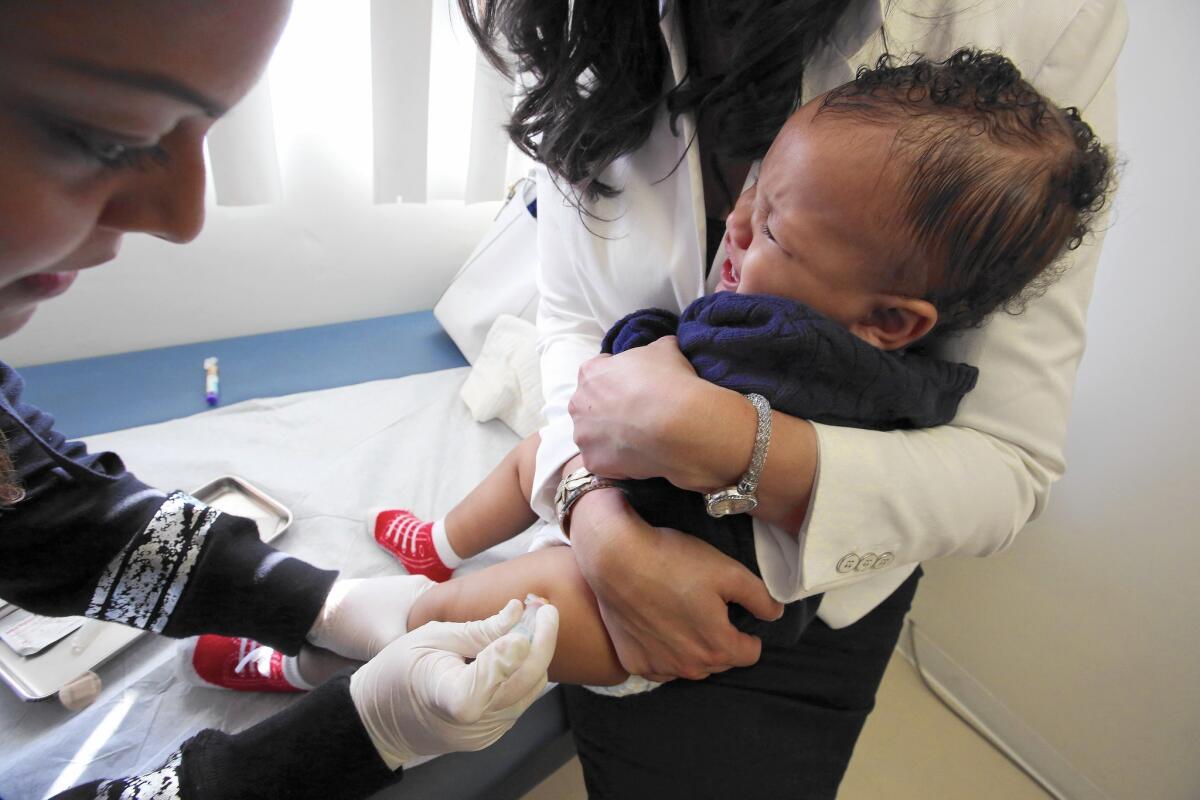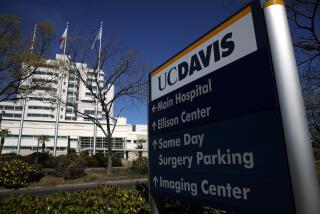California’s measles outbreak is over, but vaccine fight continues

- Share via
Reporting From SACRAMENTO — California officials on Friday declared the end of the Disneyland measles outbreak, but the political battle over immunization that it sparked continues to rage on.
In announcing that the health scare had passed, state medical authorities warned that California remains at high risk of another outbreak because immunization levels in some communities remain so low.
The state epidemiologist, Dr. Gil Chavez, said immunization rates in some schools are at 50% or lower, creating an ideal environment for the virus to spread quickly. A study published in JAMA Pediatrics last month calculated that the measles virus that caused the outbreak spread in areas where vaccination rates were likely between 50% and 86%.
But it remains unclear how much the Disneyland outbreak changed attitudes about immunization.
Legislation in Sacramento intended to induce more parents to get their children the measles vaccine and other shots stalled this week amid an outcry from anti-immunization forces who said the government should not tell parents what to do.
The debate on the bill has turned contentious. Last week, Robert F. Kennedy Jr., a leading anti-vaccine activist, used the word “holocaust” during a film screening to describe the purported damage done by vaccines to many recipients, a statement for which he later apologized.
State Sen. Richard Pan (D-Sacramento), a pediatrician who is pushing for greater vaccination, has been bombarded with personal attacks. One Internet posting imposed a Hitler mustache on Pan’s face; another said: “Can we hang Pan with a noose instead?”
While there has been a surge in vaccinations amid intense media focus on the issue, health officials say the immunization problems are so bad in some communities that a major outbreak could easily happen again.
The idea that the measles vaccine was linked to autism has been thoroughly discredited by scientists. Still, measles vaccination rates in California’s kindergarten classes have been declining over the last dozen years.
Among those whose vaccine status was known, about 7 out of every 10 California measles patients in this outbreak were unvaccinated. “If we had higher levels of immunity in the community, this outbreak would not have happened,” Chavez said.
The Disneyland outbreak sparked an aggressive response from health officials across California and beyond that experts say helped keep the disease from spreading even further.
Public health officials contacted thousands of Californians in 12 counties potentially exposed to measles, leading to warnings in airports, malls, schools, clinics and hospitals. In one hospital alone, a single person with measles exposed 14 pregnant women and 98 infants, including 44 in the neonatal intensive care unit.
One local agency estimated spending 1,700 hours on the measles investigation.
About 1 in 5 who got the measles in California had to be hospitalized. One collapsed at home, was placed on a mechanical ventilator due to severe pneumonia and developed multiple organ injury. Another suffered acute respiratory distress syndrome and had to be treated with an experimental drug that required special approval from the U.S. Food and Drug Administration.
In all, 131 California residents were believed to have been infected with measles during the outbreak that began at Disneyland, as well as at least 26 people who resided in seven other states, Canada or Mexico, after visiting the Anaheim theme park or catching the virus from someone who went there.
Experts credited public health officials with recognizing the outbreak early and aggressively moving to identify the sick and isolate those exposed to the virus, giving out immunizations and other medicine to the exposed to keep the disease from spreading.
“It’s over, and it’s due to incredibly good public health,” said Dr. James Cherry, a UCLA professor and primary editor of the Textbook of Pediatric Infectious Diseases.
The outbreak prompted two state lawmakers, Sens. Pan and Ben Allen (D-Santa Monica) to push for closing a loophole in state law that gives parents the right to refuse state-required vaccinations due to their personal beliefs while still sending their children to public and private schools.
Early on, the bill appeared to have momentum, winning approval of the Senate Health Committee after Gov. Jerry Brown signaled he was open to considering an elimination of all but medical waivers to vaccines.
But SB 277 stalled this week in the Senate Education Committee, where members demanded changes after hundreds of parents lined up to say they would pull their kids out of school if the bill passed. A vote is scheduled for Wednesday.
“There is a problem in denying a child a public education,” said Jean Munoz Keese, a spokeswoman for the California Coalition for Health Choice. Referring to the announcement that the measles outbreak had ended, she said, “It confirms what we have said all along: that we have no crisis.”
The bill faces a difficult future, said Larry Gerston, a political science professor at San Jose State University.
He said the opposition is a blend of libertarians suspicious of anything the government mandates, people who believe in “natural health” remedies and worry vaccines will harm their kids, religious people and parents who don’t have the means to home-school their children if they don’t get a waiver.
“That’s quite a combination,” Gerston said. “One or two of these interests might not be enough to stop the legislation, but these many different sources of opposition, Pan and his allies have their hands full.”
Pan and Allen say they believe they can salvage their legislation and are willing to consider allowing some kind of religious exemption, though Allen said he knows of no mainstream religion that is doctrinally against vaccines.
“There is still an absolute consensus amongst folks in the medical and scientific communities that we have let our vaccination rates drop too low and that any attempt to increase the vaccination rate is an important thing to do,” Allen said.
There are other ways to achieve higher vaccination rates. One idea is to make it harder to get a vaccine exemption, said Saad Omer, an associate professor at Emory University and expert in vaccine policy.
For instance, the state could require parents at the beginning of every school year to write a letter explaining why they don’t want to vaccinate their child, and require it to be notarized and the parents to be counseled by a physician on the risks of not vaccinating.
New York City’s public school system, for example, requires parents to submit a written explanation of religious principles that guide objections to immunizations. Under New York state law, the school system can reject a request for an exemption, and it tells parents that state law does not permit exemptions based on personal, moral, secular or philosophical beliefs.
A federal appeals court in January upheld the New York law as constitutional.
Twitter: @ronlin, @mcgreevy99
Lin reported from Los Angeles, McGreevy from Sacramento.
More to Read
Sign up for Essential California
The most important California stories and recommendations in your inbox every morning.
You may occasionally receive promotional content from the Los Angeles Times.












